At the TNB cinema, we had the privilege of meeting François Ozon and Benjamin Voisin, a few weeks after the presentation of L’Étranger at the 2024 Venice Film Festival.
During this meeting, we learned about the bold choices made by a director confronted with a classic, and the subtlety of an actor immersing himself in the inner world of an enigmatic character.
From the power of a novel that has become legendary to the intensity of a mise-en-scène where light, bodies, and silence interact, these exchanges shed light on the uniqueness of a film that is both faithful and deeply contemporary.
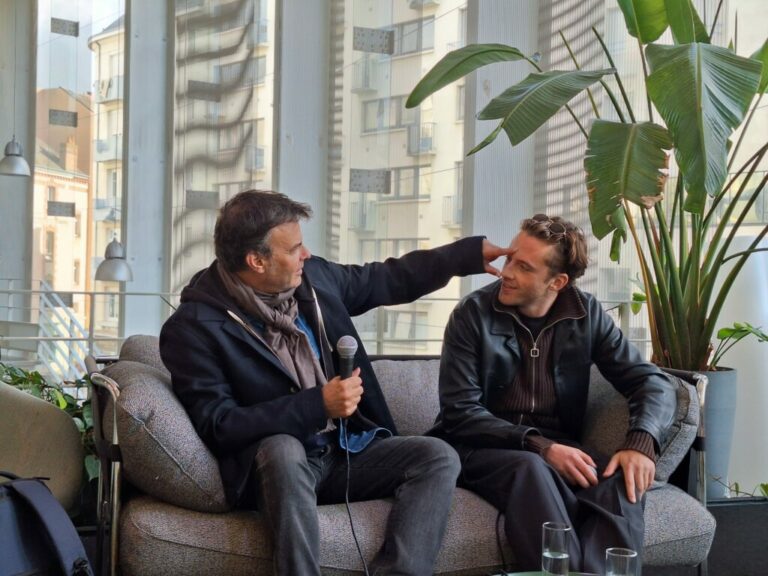
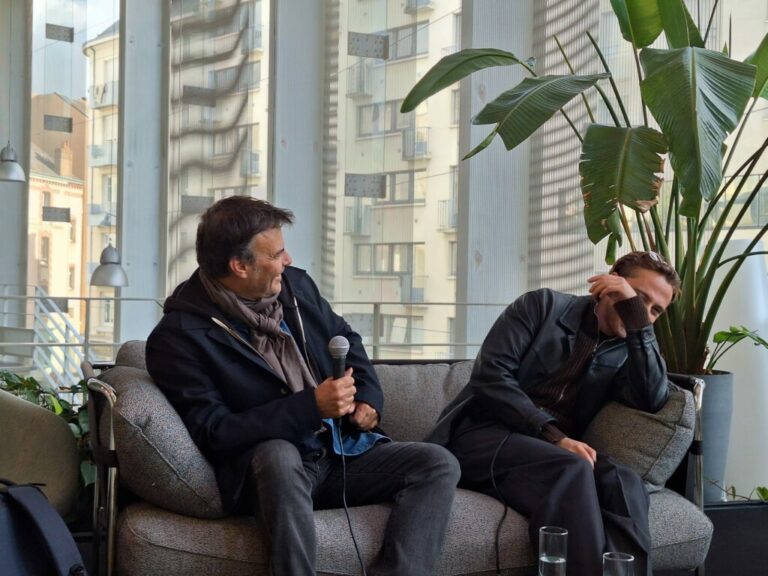

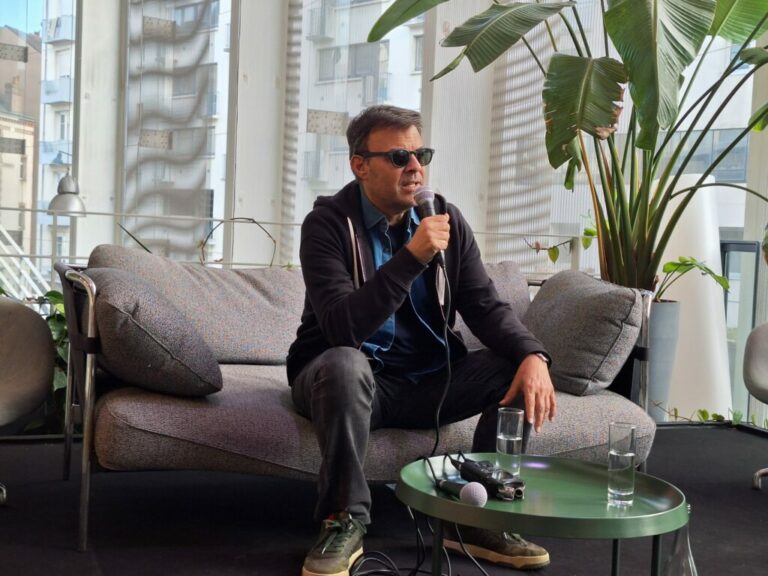
François Ozon: When I reread the book, I was quite struck by the invisibility of Arabs. That’s it. So I needed to understand when this book was written. It was written in 1939, at the height of French colonization. Algeria was France; they were two French departments. So it seemed essential to me that today’s viewers, and even myself, should contextualize the story, so that we understand that it’s no coincidence that he kills an Arab, in what world, in what country it ultimately takes place. So I immersed myself in it. The great thing is that there are lots of archives, lots of photos, there are lots of documentary reports, and I came across these images of Algiers filmed by French colonists, where I found this extremely shocking commentary that immediately reveals the French colonialist view of Algeria and helps to contextualize this story and better understand why things happen the way they do.
Cinema Reporter: In Venice, you said that the issue of French Algeria was present in many French families and that it was often still taboo today. Was this a thought you had even before you started working on The Stranger, or did it come to you as you were developing the adaptation?
F.O.: Actually, as a film buff, I had noticed that there are ultimately very few films that deal with Algeria. There are a few films that deal with the Algerian War, but you get the feeling that it’s a bit of a taboo when you compare it to what the Americans have done with the Vietnam War. They have done a lot of historical work, but also artistic work, on this war, on the guilt of the Americans in relation to what happened, in relation to their responsibilities. In France, it is still very painful. There are a lot of scars and, ultimately, few filmmakers have tackled this subject, particularly in relation to French colonization before the war. We often talk about the war and the aftermath of the war. But ultimately, there are few films that talk about the period of colonization. So I knew that, and as I worked on the subject and prepared the adaptation, I became even more aware of it. Fortunately, there are many archives and a lot of newsreels that were filmed. But these images are very biased, as we see at the beginning of the film.
C.R.: How do you view Camus’s thinking on this subject?
F.O.: It’s very ambiguous, actually. Camus was heavily criticized, and he is still criticized, particularly in the United States, for this invisibilization of Arabs. It’s true that this is what shocks us today. That’s why I begin with the sentence that shocks me as a reader today: “I killed an Arab, and today my mother died.” I felt it was important to say that. I think Camus is fully aware of what is happening in Algeria, but it’s important to remember that Camus was born there, it’s his country, he loves this country. Just before writing The Stranger, he wrote reports on Kabylie. He was fully aware of the status of the indigenous people, the Arabs who were considered indigenous, who did not have equal status with the French. He knew there was poverty. So I think he had all that in mind when he wrote The Stranger. After the book was published and became very successful, he never wanted to link it to what would happen after the Algerian War. But as a reader today, I can’t help but think that the book foreshadows what was to come. So I worked with Manu d’Acos, who is my frequent director of photography. I had worked with him many times before, notably on Grâce à Dieu. Very quickly, the idea of black and white imposed itself because we wanted to push the highlights, and black and white allows you to do that. There was also the fact that the archives and our entire collective memory of that era, which no longer exists in French Algeria, are in black and white. It seemed to me that it would bring a sense of realism and allow viewers to immerse themselves more in this world that no longer exists. And then there was also the economic reason. We didn’t have the means to recreate 1930s Algiers in color. So it’s true that black and white simplifies a lot of things.
In the book, we never learn the name of the man he kills. In fact, he is always referred to as “the Arab.” However, in the last scene—don’t give it away—you decided to name him. Why did you make that choice?
F.O.: What’s important to me is that when I was adapting the book, it was impossible to do so as if I were still in 1942. It’s 2025, so I had to look at this story from today’s perspective and everything that has happened since the book was published. In a way, I try to integrate this into my staging, particularly Kamel Daoud’s book, Meursault contre-enquête, in which he tells the story from the Arabs’ point of view, from the point of view of the brother of the Arab who is killed. And for me, it’s also important to give him a name and, above all, to develop the character of the sister, whom I call Jemila, who has no name in the book and who allows the voice of the Arabs to be heard in this story. It was a choice that seemed obvious to me, but it’s also a political choice. It’s also a way of showing that when you adapt a classic, you inevitably connect it with our perspective today. It’s like in the theater when someone adapts Hamlet or Chekhov, they connect it with the present day. It was obvious to me to do that.
C.R.: Precisely, how did you go about this adaptation? Knowing that Visconti had already tried his hand at it. And Benjamin told us earlier that he sensed that you were putting pressure on yourself.
F.O.: I always put pressure on myself when I make a film, but it’s true that the stakes are complicated here because it’s a very well-known book that everyone has read. You had read it before seeing the film. So there you go. Well, there are as many Meursaults in your heads as there are people, everyone has imagined this character, everyone has staged this story in their head. So, inevitably, there are high expectations. I knew I was going to divide opinion, that there would be people who would say to me, “Meursault isn’t like that at all, the story shouldn’t be told like that.” The book is about to enter the public domain. I’m waiting to hear everyone’s versions of The Stranger. After that, it’s my version that I felt. So it’s one vision of the book. But inevitably, when you tackle a bestseller and a masterpiece, there are bound to be people who don’t see themselves in it as they imagined. For me, it was obvious that we shouldn’t use more voice-overs, because the book is told in the first person. But I was interested in the viewer not having the same experience in reading as in the cinema. These are two different languages, literary language and cinematic language. I was particularly interested in the first part, where we are observing and feeling. We don’t identify with the character because he is someone we find difficult to identify with, but we are more fascinated, curious, trying to understand why he acts the way he does, why he does what he does. So it seemed to me that the voice-over should only come in at key moments. And in fact, I chose two moments that for me are the two most beautiful moments in the book: the moment of the murder and the end, where Camus’s language is a little different from the rest of the book. If you know the book well, it’s more of a white writing style at the beginning, very factual, behaviorist. And then, all of a sudden, we find ourselves in a much more lyrical language, which for me is more Camus’s voice than Meursault’s. And I found that having this break in the voice-over and seeing the character’s inner thoughts was very powerful. So, I knew, we didn’t know if we were going to use it or not, and it was really during editing that I realized it worked very well, especially after the murder.
If we focus on the murder scene on the beach, we really felt something erotic, something very sensual about the ambiguity. Was it intentional to film this scene in this way?
F.O.: Yes, it’s a very mysterious scene in the book. We thought about it a lot. I wondered how I was going to film it. That’s kind of the whole challenge, because we’re not dealing with psychology at all, we’re dealing with something very sensory, since Meursault expresses almost no emotion, but he feels things. So I wondered how I was going to shoot this scene, and I thought a lot about Sergio Leone’s westerns, where, you know, when there’s a duel, they’re face to face, there are close-ups on the eyes, on the hand, on the revolver, all that. There’s also a dilation of time, a focus on rhythm, making the moment a little abstract. And then there’s this rather mysterious thing in the book. Camus says that Meursault takes a step towards the Arab. So why does he take that step? Is it to escape the sun? That’s impossible because he doesn’t step into the shade. There you go. In any case, that’s what provokes the Arab to pull out the knife and then the revolver. And I wanted that suspended moment to be a little abstract and indeed sensory because they are both beautiful. That’s it, and it had to be accepted, and it seemed to me that in any case, eroticism in a certain way seems necessary to me in this story in order to understand it better. Whether it’s with Marie and Meursault, or between the Arab and Meursault, it seemed to me that the film had to be about feeling all the time and not about expressing ideas, except in the second part, but in any case, the whole first part had to be sensual and sensory.
Speaking of the beach, it plays a very important role in the film, it’s a turning point, and in many of your films, there are often beaches. What does the beach mean to you?
F.O.: I’m not into analysis, that’s up to you, it’s your job to analyze films in relation to each other. But it’s true that I like filming on beaches. First of all, I love going to the beach. That’s personal. Then, when I was younger, I used to say, “I like filming on beaches because it allows me to ask the actors to undress, to film their bodies. Not necessarily naked, but in swimsuits. When I made a film like Under the Sand with Charlotte Rampling, there was the body of this 50-year-old woman with her husband, and her husband goes swimming and disappears.” It’s true that the beach is a place that is both concrete and at the same time tends towards a form of abstraction, because there’s the horizon, there’s the sea, there’s the sand, there are very few elements, and there are the people who are there. I feel like we touch on a kind of truth about what it means to be human on a beach, where we are also naked, we are just there, there is the sun, the elements. So it’s true that when I decided to adapt The Stranger, I thought to myself, well, there is this central scene on the beach. Anyway, I was excited to film it, even though I was a little worried because I didn’t know exactly how I was going to do it.
Why did you choose Benjamin Voisin? We have a semblance of an answer, but what made him your Meursault?
F.O.: It’s true that I had worked on another project about a young man of today who is a little disillusioned with the world and doesn’t understand what’s going on today. It was a very contemporary film, and he attempted suicide, but we couldn’t get the film financed. No one wanted to put money into it. It was pretty dark, I have to admit. So I reread the book, and as I was rereading it, I thought to myself, it’s incredible because everything I’m saying is so much stronger in The Stranger. I had read the book like everyone else when I was 16. I had forgotten it a little. I found that the book still had power and mystery. So I talked to Benjamin about it right away, I said, “What if we did that?” And he was immediately on board. I think you’ve seen Benjamin, he’s quite an expressive, extroverted person, and for him it was a real challenge to play such an introverted character who hides, who doesn’t have to act, who doesn’t play the game of society, who doesn’t play in general. So for an actor, I think it’s quite an exciting role to play.
C.R.: Benjamin told us that you gave him Bresson’s notes on cinematography to help him get into character. Did you give it only to Benjamin or to all the actors?
F.O.: And no, I only gave it to him because the other actors, in fact, it’s like when I chose when he goes to the Schuns cinema where you see Fernandel playing the same line in lots of different tones and ultimately each actor plays it in a different tone. Rebecca plays more on seduction. Benjamin is very neutral, like a Bresson model. Pierre Lottin plays a bit of a supporting role from the 1930s. Lavan plays a slightly clownish character that verges on the grotesque, so all the actors around him had to be very lively. So my direction was very different for each actor.
C.R.: And on the casting, which we can say was five-star. Can you tell us a little about each of them? Christophe Malavoy, Pierre Lottin, Denis Lavant, Swan Arlaud, Jean-Charles Clichet, for example, and Nicolas Baude. Why did you choose them, given that Camus doesn’t describe his characters in much detail?
F.O.: Yes. But you, on the other hand, make the choice. If there’s one character who is perhaps described the most, it’s Marie. Well, he doesn’t describe her face. We don’t know if she’s brunette, but she’s tanned in any case and she often wears red or white dresses. That’s all we know. But it’s true that the characters are very poorly described, even their ages. So I had to represent them as I imagined them, and it’s true that on this film, I worked with a lot of actors I had already worked with because, in the end, it was a fairly complicated film to make. We didn’t get the funding we wanted. We felt that even though it’s a very well-known book, a lot of people were afraid of the subject matter. Many financiers didn’t necessarily believe in it, so I called actors I had already worked with, who I got along with well, most of whom are friends and who trusted me. In particular, I’m thinking of the role of the priest at the end, played by Swan Arlaud, which is a small part. It took me a while, it took Benjamin and me a while to pluck up the courage, because at first I thought it was too small a part, I wasn’t going to ask him to come for two days of shooting. But in the end, we saw lots of actors and none of them were what I wanted, so I called Swan and said, “Listen, we’re doing a read-through with Benjamin, let’s see if it works or not.” I’m not sure you’re right for the role, but if it works, I’d love for you to do it.” We did the reading, and I thought it was great that he was a rather attractive, rather young priest, rather than the image of an old priest as I might have had in Grâce à Dieu, for example.
C.R.: Can you tell us a little about why you built the sets in Tangier rather than Algiers to recreate Algiers at that time?
F.O.: It’s impossible to shoot in Algeria, in Algiers, especially this story. It’s very complicated because of the political tensions between France and Algeria and the Algerian government. So often when we depict Algiers in the 1930s and 1940s, we shoot in Tangier, which is also a Mediterranean city with many architectural similarities between Moorish and Ottoman buildings, or rather Hispanic buildings in Tangier. But anyway, it worked for certain things, and then there were special effects that made us really believe we were in Algiers. I have Algerian friends who saw the film and said to me, “What you’ve done is magnificent, it’s much more beautiful than Algiers.” But they thought I was going to shoot in Algiers.
C.R.: Camus doesn’t describe his characters much, but he does describe the settings. I’m thinking of the cabin, I’m thinking of the cliffs. Were those things you were very attached to?
F.O.: Yes, but that’s a cabin on a beach. We had to build it, of course. But what was interesting was also seeing Visconti’s film, which was shot in Algiers on location, particularly Rue de Lyon, where Camus lived when he was in Algeria. So it’s interesting to see the real settings, and then we had to reconstruct and find other settings.
C.R.: Something that strays a little further from Camus, at least in terms of the staging, is the choice of soundtrack. You chose Killing an Arab by The Cure, for example. Was that an obvious choice for you?
F.O.: I’m a fan of The Cure. I had already used one of their songs in Été 85, and it’s true that this song, which is one of The Cure’s first hits, couldn’t be included in the middle of the film. We could have tried, and maybe it would have created a very strong distancing effect, but I really liked putting it at the end because it’s a song I love, and I knew that Robert Smith had been a little annoyed because the song had been appropriated by far-right movements who took him at his word and had absolutely no knowledge of the book The Stranger Stranger, so Robert Smith stopped playing the song for a long time. In fact, at some concerts, he didn’t sing Killing an Arab, he sang Kissing an Arab. So when I suggested using it in the film, he immediately agreed because it allows the song to be linked to the film and people really understand the lyrics after seeing the film. You realize that you understand the whole meaning of the song and its power.
C.R.: Was there a scene that was more difficult than others to stage or conceptualize, and that you struggled with?
F.O.: I think the scenes that were complicated were the beach scenes, because we shot in March and April and the weather wasn’t always nice, and as you saw in the film, the sun is very important. So we had to wait for the sun. The actors were freezing. We were all wearing down jackets. They were in swimsuits or very light clothing. So it was a bit complicated, but in the end you can’t tell from the footage. That’s the main thing.
C.R.: The film you were planning to make before you started working on L’Étranger, is it still in the pipeline somewhere, will it be released one day?
F.O.: Maybe, maybe I’ll pick it up again one day, but not for now. I’m happy to have made L’Étranger. Sometimes you have to take strange paths to get to the film you make, and ultimately that’s part of the story of L’Étranger. So in a way, I’m turning the page.
C.R.: A question about the reception of the film in Venice at its first screening. Were you happy with the reception and the reactions? I saw the film in Venice and I thought it deserved an award, especially Benjamin Voisin and others, but unfortunately it didn’t win any prizes…
F.O.: I was very happy to present it in Venice because, you know, 58 years ago, Visconti presented his own version of The Stranger in Venice. So I was very moved to be selected for the festival. Afterwards, it’s true that we always hope for awards, especially for the actors, but then we know how juries work and that it’s often political, it’s a matter of choice. So just being selected, being shown in Venice, was already very good.
The famous line “Maman est morte aujourd’hui” (“Mom died today”) isn’t in the film.
F.O.: No, but he says it anyway. He says the line to Marie when he’s in the bath, she sees his armband and says, “Are you in mourning?” and he says, “Yes, Mom died.” It’s very anecdotal compared to the opening of the novel. It was a choice to remove this cult phrase at the beginning. Well, yes, the choice, what I was saying earlier, when I reread the book today, what struck me was this sentence that comes in the second part of the book, “I killed an Arab.” It seemed to me that it was stronger to start with this sentence. We need to put the opening sentence, “Today, Mom died,” into context. In 1942, in French literature, we didn’t have the same thing as in world literature. This kind of sentence was very modern, to start a book like that. Today, I don’t think it has the same power. So I thought it was more interesting to start with the other sentence. Thank you.

Benjamin Voisin: We had another film with François before that didn’t happen for various reasons, which already touched on some of the themes explored in Meursault, namely a young man who isn’t necessarily inclined to play the social game, isn’t necessarily into the idea, and is simply quite close to committing suicide. Anyway, we already had someone who was quite dark and detached from reality. So for this project, when François came to me and said that it was very similar to The Stranger, he reread it, we talked about it again, it slowly came together, and then it was a matter of continuity. So there wasn’t this violent thing of “we’re going to have to make Meursault’s The Stranger into a movie.” I had already started to tackle these themes a little bit in my acting. So it was less violent and more pleasant.
The character of Meursault is very complex in the book. We have access to his thoughts, but in the film, everything comes through your acting. How did you work on this role?
B.V.: That was the good thing. François quickly told me that there might be one or two voice-over passages so that we could still hear Camus’s writing, his prose, but that he didn’t want any. There’s a lot of voice-over in Visconti’s film, and in the end, that’s what perhaps makes the film too easy. It can feel a bit like a page-by-page adaptation. So the challenge was really to get inside his mind. We talked a lot, and François said to me, “If there’s ever a moment when you’re acting, I think the camera will be impervious. It’s not going to work. It can’t be acting. ” So it was a preparation that took me longer than expected. It took me four months to try to… I believe that human beings have all emotions to some degree. I went and took Meursault’s emotions, which are within me, which are quite the opposite, and I brought them to the surface while making others disappear. So, in my private life, for four months, I was quite gloomy, quite flawed, with a much more distant, much less concrete outlook than usual. It was a kind of sacrifice so that I could arrive on set and let the character play itself, without having technical control, which I can sometimes do on other films.
C.R.: Here you had a cult text, did that put pressure on you?
B.V.: I like pressure. I like the idea that my grandparents will have the opportunity to see their grandson play Meursault in The Stranger, which was written almost in their time. So that alone takes a lot of the pressure off. There’s a lot of joy in that. And then I like the responsibility. I think it’s a wonderful gift that cinema sometimes gives me by thinking of me for roles like this. I was able to work at the Théâtre Céline, I was able to do Balzac, Laakamu, and there are also contemporary texts. I’m very happy about that. Above all, I’m very flattered.
How much freedom did you have on set to play this role?
B.V.: You’d have to ask him. I have a memory of it. It was funny because we had already made a film together called Étés 85 (Summers 85) when he was, I think, 15 or 16 at the time in 1985. So he had a very precise image of what he wanted to convey in this character I was playing, who was a bit of an idealization of the beloved. So I trusted him, and they really made me “go along with his thinking.” Whereas here, you quickly think, “Shit, we don’t have the key, and I don’t have it either.” We don’t know who Meursault is, and we’ll never know. We humbly tried to add sensuality, a body to it, by questioning what we had in common. But in terms of directing the actors, there wasn’t any, there was almost none. I saw him directing Pierre Lottin and Rebecca Marder more. After all the discussions we had together, we were more curious to see the character as such. Let’s see now how we stage it. What was annoying were the scenes where we suddenly saw that it wasn’t working, and there were few of them. But in the two or three scenes where it was the role, we saw him acting, we saw me acting. It was either the script or the staging that had to change, or the suggestions, or the editing. We grouped a scene together a lot because everything seemed forced, everything seemed manufactured, which was exactly what we wanted to avoid, and that’s how it is. I wasn’t more awake or less awake than any other day. I wasn’t any worse. It was the scene that didn’t suit the role. It’s really interesting to see that. When it was happening for real, there were no questions. We did it, it was done, we moved on to the next thing.
All my characters are like that, nobody knows them, but what’s annoying is that nobody knows them physically, yet everyone knows them intellectually. When we screen the film, 95% of people have already read The Stranger, and 100% of them liked it, loved it, hated it, didn’t understand certain things, but weren’t bored. So everyone has their own point of view on The Stranger.
C.R.: And what was your point of view on this character? At the time, today? Before and today, has it changed?
B.V.: I read it very early on when I was 14-15 years old. I was bored at school. Before high school, I read it in middle school, I read a lot of different things and at the time it remained quite incomprehensible because I completely understood what he was talking about. There’s a quote by Balzac that says: “I think of those who must find something within themselves after disenchantment. ” And that’s true for many people, it depends on the individual. For some it comes, for others it doesn’t. I know that when I passed the age of naivety, the age of childhood when you actually enter a serious world, there are people for whom we have to work, we have to be paid to survive, so we don’t die. The difference between people sometimes points them out from the outside, and we even go so far as to wage wars over it. The world we live in, compared to the way I saw it when I was a child, when I invented pirates and everything, has obviously evolved. Reading came as a solution for me. But when I discover Meursault in it, I tell myself that he understands this but can’t find a solution. He’s not going to try to fight it. For example, I found seduction in seduction, whether romantic or even professional. I chose a career based on the desire of others. If a director doesn’t want me, I’m not going to force my way into his film. He’s not going to play along at all. He’ll never lie. I love lying. I can spend four hours in a bar if I feel that the lie will help create other truths at another time. But to create a good moment, I do it without any problem. He never does. So it still creates… I think to myself, it’s funny that I accepted that path. Basically, that’s what I was thinking. For four months, I was able to work on that a little.
C.R.: Do you think this character has meaning today in our contemporary world in his way of being, his way of thinking?
B.V.: What’s interesting, I think, and even more so for me, is that I often make films for my generation. I think it’s interesting that a young person today doesn’t lie to himself, doesn’t try to fit into the boxes that are expected of him. Obviously, there are things about him that can be too violent. But what interests me is that this man ultimately finds himself. I think Camus also enjoys making him experience the most violent things possible in the second part of the book. A trial, the demand to justify himself, imprisonment, loneliness, and then execution. Despite these five things, at the end he says: “I think I was happy, and I still am.” I think it’s interesting that despite the twists and turns, which are huge in Camus’s work, in everyday life, despite the twists and turns, if you’re still a little close to yourself and you’re assertive, I think people are more interesting when they know who they are to others. Despite everything, I think we get along better with ourselves in life in general.
C.R.: And precisely this strength of character, determination, self-confidence, that he is a very strong person and always thinks he is right. How did you embody that?
B.V.: He doesn’t say he’s right. When asked, he says it doesn’t matter and he doesn’t know. On the contrary, he admits many times that he’s wrong and that there’s no point in finding a reason. Some things are concrete. The sky is blue, I can tell you that in 14 different ways, the sky will still be blue. I love you. I can tell you that in 14 different ways. You will think 14 different things. Explaining what is obviously concrete is easy. Explaining a feeling is impossible. That’s what’s beautiful about it. That’s why you have to trust your instincts because there’s no need to explain it. It’s something that’s within you.
C.R. In Camus’s thinking, there is this notion that when faced with the absurd, one must not give up, one must not commit suicide, but rather revolt.
B.V.: It’s the continuation, the second cycle of his philosophy. We see a little bit of it in the final scene with Solal, where we see him opening up to what will later become the philosophical cycle of The Rebel. But that’s not at all what… As soon as I read stuff about The Rebel, I thought to myself, that can’t be right, you have to imagine Meursault as happy. No, I couldn’t use it to play Camus’ The Stranger, even if it’s a very beautiful sentence.
C.R.: Precisely, this scene with Swan Arlaud is explosive compared to the rest of the film, where you are more restrained, more emotional. What is it like to play a scene where everything explodes, where everything comes out?
B.V.: Actually, what’s quite interesting is that we shot it on the first day of filming, so we didn’t know what Meursault was going to be like. We didn’t really have the confidence that comes with a few days of filming. So François and I threw ourselves into it. The staging was quite fragmented, quite François-like, I think he invents a lot on the spot. We had specific guidelines. And when it comes to the climax, it’s a specific moment where I think we did 15 or 16 takes, all of them completely different. One laughing, one crying, one in distress, one very cold, one shouting, and I don’t know what he did in the editing, but he mixed it all together. But the idea was to play it safe so that the explosion might not be an explosion. It could also have been a calm and cold statement.
C.R.: Can you tell us about your chemistry with Rebecca Marder, which is very visible on screen? Is it something you worked on despite everything, or was it really natural between you from the start?
B.V.: It’s funny because, honestly, I think it’s the way François films us. I didn’t listen to any of my partners at all. I never really acted with Rebecca. I never acted with Pierre Lottin or Denis Lavant. I love Denis Lavant as an actor in the theater, and I was so happy to act with him. But in the end, I realized that I wasn’t listening to these people because the script says that he’s not really interested in any of that, so I was less focused on them. I think it’s the way François films us together that’s interesting.
C.R..: And precisely François on set, in relation to the fact that he was tackling a myth of French literature, or at least the most widely read French novel abroad. Did you feel any pressure from him in relation to that?
B.V.: It was good. It was moving to see the doubt in this man who knows the film business very well and works in different genres. He’s very gifted, very talented. It’s also pretty cool to suddenly see him under a lot of pressure to adapt something that’s perhaps more significant than anything he’s had the opportunity to adapt before. He’ll tell you about that. And in concrete terms, in relation to Summers of ’85, there are some notable changes. It’s everything in general. He wouldn’t have shown me the rushes while we were shooting Summers of ’85. Here, I had access in the evening, and we watched a little bit of what it looked like. He was perhaps curious to hear many different opinions in preparation. He called different people to read the script, to talk about it, great philosophers, different people, which I don’t think he does on all his films. Because he wants it to remain a personal project, but in this case, I think he was smart enough to realize that the adaptation shouldn’t just be personal. It also had to make sense today. Which I think is great. Honestly, I wouldn’t have made the film if I had found the adaptation boring, dusty, or even lacking in meaning. When you adapt Camus, you have to find the meaning, otherwise there’s no point.
C.R.: I believe you said in Venice that you had reread Bresson’s Notes on The Cinematograph.
B.V.: I didn’t reread it, he sent it to me. He sent me quite a few passages about the difference Bresson makes between an actor and a model, between someone who acts and someone who lives. It’s extremely interesting, it’s detailed, it took me four months of my life. The only thing I wonder about in this case is the paradox: why do the same things over and over again in life? We never say the same sentence four times in a café. If we’re living, it’s very hard to repeat the text. For me, the biggest difficulty was doing retakes. I don’t know what to do anymore. We have it… No, to be sure about the sun, we don’t care about the sun. And actually, no, of course we do care, but in the moment, if we really want to seek life, no one repeats themselves four times. You’re not going to repeat the same question to me more than four times right now. So that’s the interesting thing, that he didn’t write too much, or maybe I didn’t read everything, but there you go, finding how to revitalize life by staying close to what we’ve already done is a bit of a paradox. We should only do one take every time.
C.R.: Did you compare this role to other roles you’ve played before?
B.V.: No. I was happy because when I made a film with André Téchiné called Les Âmes sœurs, he said to me, “You’re not bad when you have a partner with you. If I ask you to pick up the phone and there’s no one on the other end, you won’t be the actor I call first.” So I went to do a monologue in the theater to work on my imagination a bit. So it was really quite new for me to have so much time with François filming me and no text, no dialogue, just a mental thought. So, frankly, it seems like something completely out of this world to me right now. I can’t really think of anything similar I’ve done.
C.R.: And have you seen the film? What do you think of yourself in it?
B.V.: There are as many Meursaults as there are Strangers. So I can understand why some people might like it and others might not. Now it’s not me anymore, my job as an actor ends when the film is finished. After that, if I start freaking out about what I did or didn’t do, I don’t think about it.
.

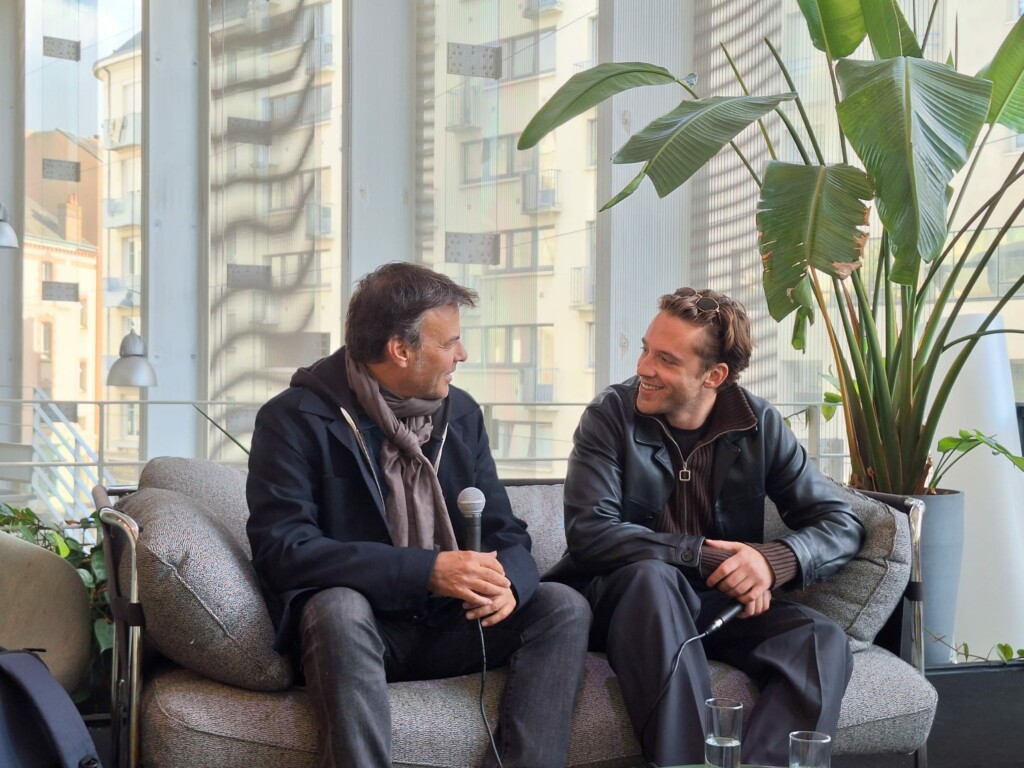

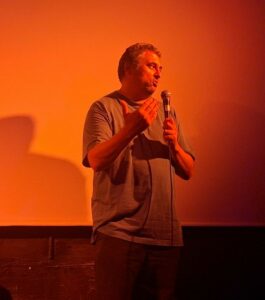

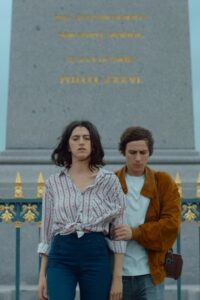
Be First to Comment